Most Americans expect to receive a tax refund this year, and are more upset by people who don't pay their fair share than the amount of taxes they themselves pay
More than half of those in the latest Economist/YouGov Poll claim they expect an income tax refund, so perhaps April 15 may not be too painful for many Americans. They do prioritize reducing the deficit over cutting taxes, and more are bothered by those who get away with paying less than their fair share than by the amount in taxes they themselves pay.
52% expect a refund, just 13% say they have to pay more than they already have paid in deductions or estimated taxes. Some Americans don’t have to file, and others aren’t sure quite yet: even when interviewed two and three days before tax returns are due, 13% said they had yet to file. While the poll did not ask whether those who had not yet filed had asked for an extension, some respondents are familiar with that process. More than one in ten admitted to having received an extension at least once in the past. This experience was more common among those older and those with higher incomes (and presumably more complicated tax forms).
Americans would rather get a refund than pay more – even if it means they overpaid their taxes during the year.
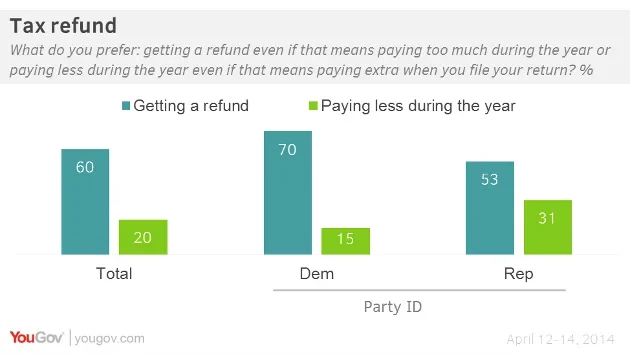
Republicans are twice as likely as Democrats to be fiscally “prudent” and say they would prefer to pay less throughout the year even if that meant having to pay additional taxes April 15. But a majority of Republicans still would rather pay more than required during the year in order to receive a refund.
This time of year the public may be especially sensitive to their tax liability, and more believe they pay more than their fair share than think their taxes are fair. Democrats, true to their party’s stereotype, feel better about their tax payments; still, nearly a third of Democrats say they pay more than their fair share. A majority of Republicans think they pay more than they should.
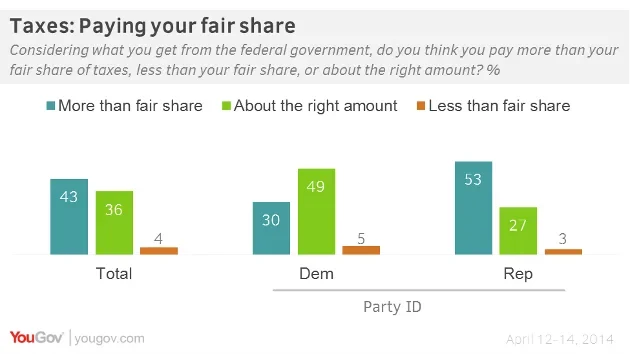
27% of Democrats in this poll said they do not have to file this year – a fact cited as well by similar percentages of those under 30 and those 65 and older, as well as those with lower incomes. 17% of Republicans say they don’t need to file.
While people complain about their own taxes, they say they are bothered more by those – particularly wealthy Americans – who manage to get away without paying their fair share of taxes than by the size of their own tax bill or the complexity of the system (as many are distressed by those who don’t pay their fair share as they are about the complexity and the amount of their taxes combined).
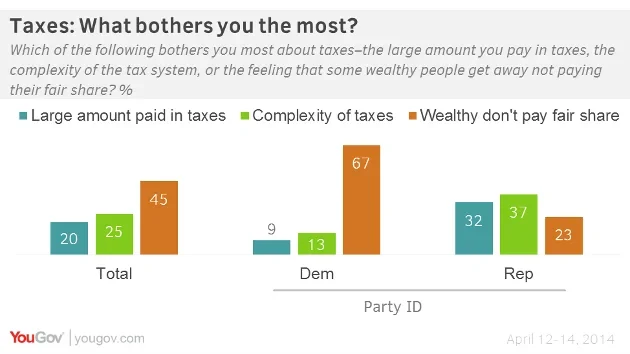
But here party differences are clear: Republicans are more bothered by the tax system itself (and are just as likely to cite the complexity as the amount of their taxes), while Democrats complain more about wealthy people who can evade taxes.
But most Democrats and Republicans agree that they would be upset or annoyed if they knew of someone who hadn’t paid all the taxes they owed: Republicans even more likely than Democrats to say this would make they very upset. 38% of Republicans would be very upset compared with 24% of Democrats.
There are problems that appear to bother Americans more than the tax system does. More critical to a majority is reducing the federal deficit. And this is something on which Republicans and Democrats agree.
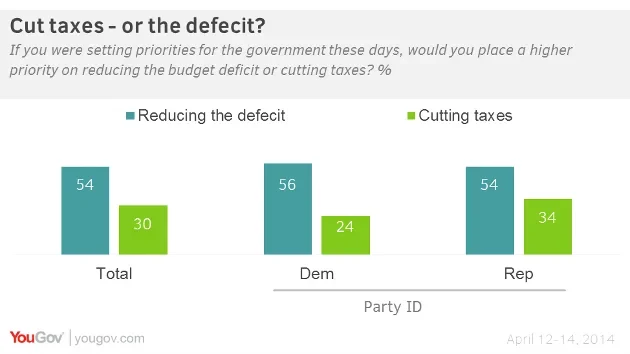
When asked about the most important issue, however, both the deficit and taxes trail the overall economy, health care and Social Security as the country’s most important issue.
The parties divide on how the federal debt problem can be solved: half of Democrats believe it only can be solved by raising some taxes, while two-thirds of Republicans disagree that increased taxes are the solution.
And the parties also disagree on what would happen if taxes on those earning a quarter of a million were raised. Democrats overwhelmingly say this would help the economy; Republicans are not so sure.
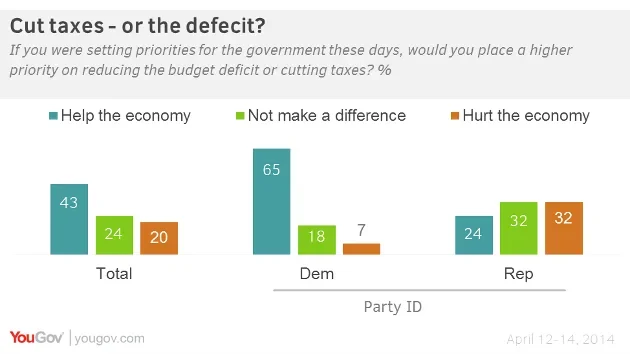
Democrats are much more willing than Republicans to raise taxes on the well-off and on corporations for other reasons as well. More than three in four Democrats would increase taxes on the rich and on corporations in order to reduce poverty; 52% of Republicans would not. Those with family incomes of less than $40,000 a year support this by nearly three to one, and those who earn $100,000 or more are evenly divided.
Image: Getty
Full results can be found here.
Economist/YouGov poll archives can be found here.










